Recognising the benefits of organic farming
Organic farming has countless benefits for the natural environment and society, but they are often overlooked. This article outlines some of the benefits of organic farming, exploring the role of science, consumers and research and innovation.
Transforming the agricultural system
A transformation of our agriculture and food systems is urgently needed to combat climate change and achieve the Sustainable Development Goals (SDGs) of the United Nations. For that reason, the European Commission has initiated several policies to make the EU food systems sustainable and climate-neutral by 2050. High targets have been set with the European Green Deal, including the Farm to Fork and Biodiversity Strategies.
To establish fair, healthy and environmentally friendly food systems, the Farm to Fork Strategy aims to reduce 50% of nutrient losses and the use of chemical pesticides by 50%, as well as the sales of antimicrobials for farmed animals. Furthermore, the biodiversity strategy targets to increase high-diversity landscape features on at least 10% of the agricultural land5.
Finally, the target of achieving at least 25% of the EU’s agricultural land under organic farming by 2030, included in both the Farm-to-Fork and Biodiversity Strategies, shows that the European Commission considers organic farming as part of the solution to achieve the other goals.
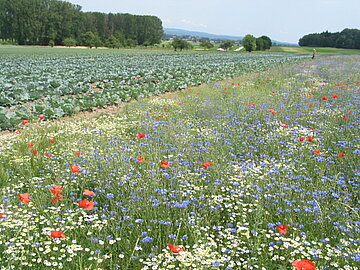
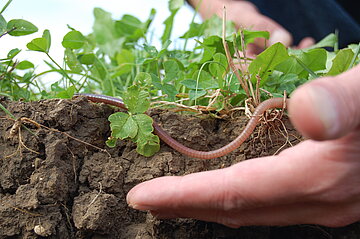
Are the benefits of organic farming properly recognized?
Though organic farming protects the environment and its production methods are backed by scientific research, the potential and productivity of the organic sector are frequently questioned by various politicians and scientists3,10. Lately, the increase in agricultural commodity prices due to the war in Ukraine is being used as an argument to give up on the Farm-to-Fork and Biodiversity Strategy Targets.
This shows that the benefits of organic farming are not properly recognised. Although it is a particularly resource-conserving and environmentally sound form of agriculture that is oriented towards the principle of closed nutrient cycles, too little trust is placed in organic farming14.
The role of science
Scientific studies show that organic farming has many advantages over conventional farming. Organic farming makes a particularly positive contribution to the areas of:
- water conservation
- biodiversity
- soil fertility
- climate protection and adaptation
- resource efficiency
- and animal welfare10.
A review of more than 800 studies under temperate climates showed that the diversity of flora, birds, insects and spiders is consistently higher under organic management. These results confirm the positive impact of organic management on biodiversity13.
Optimising nitrogen management is crucial for improving soil fertility and reducing negative environmental impacts. A comparison of nitrogen input, nitrogen output and nitrogen balance was made between 30 pairs of conventional and organic farms in Germany. In 90% of the comparisons, the nitrogen surplus was lower in organic farming systems and nitrogen use efficiency was higher in 60% of the pairs4.
The combination of organic fertilisers, compost and less intensive tillage has shown to significantly improve soil quality2. In a long-term trial with clay soils under organic management, reduced tillage resulted in a higher soil organic carbon content, microbial biomass and microbial activity compared to ploughing7.
In terms of climate change, organic systems can contribute to greenhouse gas mitigation in the agricultural sector by reducing nitrous oxide (N2O) emissions - a long-lived greenhouse gas - by 40% per hectare12. In this context, another field trial in Western Europe showed that organic practices with reduced tillage increased the soil organic carbon stocks in the surface layer by 20%, which supports carbon sequestration, the process of removing CO2 from the atmosphere and storing it in the soil carbon pool6.

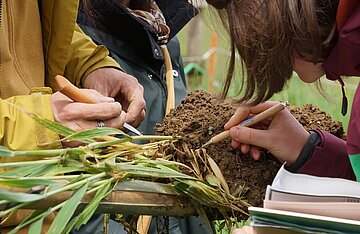
The role of productivity
The focus on productivity in the political debate ignores the many positive environmental benefits organic management provides8. While studies estimate the mean yield gap between conventional and organic farming systems in temperate climate zones to range between 20-25%, these estimates vary considerably depending on the crop and the region.
On the other hand, the organic approach can provide more stable harvests than conventional production. Studies under Dutch conditions show that the yield gap between organic and conventional farming diminishes over time because soil productivity increases and the agroecosystem becomes more stabilised. Importantly, the productivity of organic farming is particularly noticeable in extreme climate conditions, such as drought and flooding – which are unfortunately increasingly common – where organic performs about 30% better than conventional fields.
Finally, the reduction of productivity can be mitigated by effective nutrient management, as well as the implementation of precision agriculture or new digital technologies11.
The role of consumer behavior
Another focus should lie on influencing consumer behaviour and tackling food waste along the entire food chain8. Maintaining the current Farm to Fork targets will ensure food security in the long term while simultaneously fighting climate change and environmental degradation1.
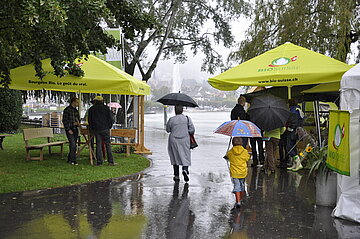
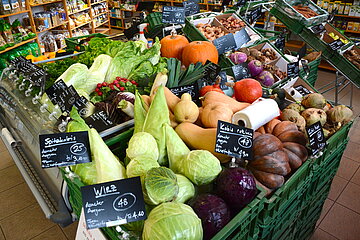
What is needed?
Research and innovation are crucial to developing and implementing organic concepts and thus making our food systems sustainable and fit for the future9. Organic knowledge and solutions can serve the whole agricultural sector and also be integrated into climate protection and nature conservation actions. For this to happen, strong advisory services, knowledgeable about organic production methods, are required.
In conclusion, organic farming is making an important contribution to sustainable food systems and will continue to play an important role in the future. To achieve the targets of the European Green Deal, more recognition and support are needed for organic agriculture and its scientific background.
The Organic Farm Knowledge platform will continue to support the exchange between scientists, advisors and farmers to contribute to the further development of the organic sector. The aim is to spread knowledge about organic farming throughout Europe based on scientific research and to foster the implementation of organic farming practices.
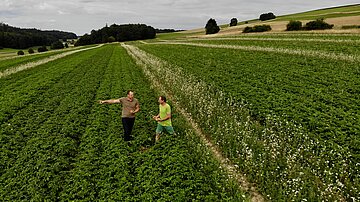
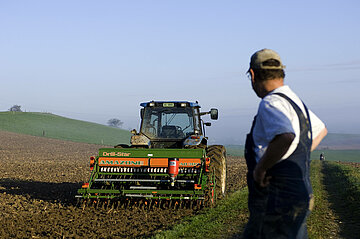
Written by: Maria Ladinig, Bram Moeskops, IFOAM Organics Europe
References
- Aubert, et al. (2022): War in Ukraine and food security: what are the implications for Europe? | IDDRI
- Aulakha, et al. (2021): A review of the influences of organic farming on soil quality, crop productivity and produce quality. Journal of plant nutrition 2022, ahead-of-print, 1-22. https://doi.org/10.1080/01904167.2022.2027976
- Barreiro-Hurle, et al. (2021): Modelling environmental and climate ambition in the agricultural sector with the CAPRI model. Exploring the potential effects of selected Farm to Fork and Biodiversity strategies targets in the framework of the 2030 Climate targets and the post 2020 Common Agricultural Policy, EUR 30317 EN, Publications Office of the European Union, Luxembourg, 2021, ISBN 978-92-76-20889-1, doi:10.2760/98160, JRC121368
- Chmelíková, et al. (2021): Nitrogen-use efficiency of organic and conventional arable and dairy farming systems in Germany. Nutr Cycl Agroecosyst, 119:337–354. https://doi.org/10.1007/s10705-021-10126-9(0123456789
- European Commission: A European Green Deal. A European Green Deal | European Commission (europa.eu)
- Krauss, et al. (2022): Reduced tillage in organic farming affects soil organic carbon stocks intemperate Europe.Soil & Tillage Research 216, 105262. https://doi.org/10.1016/j.still.2021.105262
- Krauss, et al. (2020): Enhanced soil quality with reduced tillage and solid manures in organic farming – a synthesis of 15 years. Scientific Reports 10: 4403 | https://doi.org/10.1038/s41598-020-61320-8
- Mueller, et al (2017): Strategies for feeding the world more sustainably with organic. Nature Communications, 8(1)
- Rahmann, G. (2017): Organic Agriculture 3.0 is innovation with research. Organic Agriculture 7:169–197. DOI 10.1007/s13165-016-0171-5
- Sanders J, Heß J (eds) (2019): Benefits of organic farming for the environment and society. 2nd revised and supplemented edition. Braunschweig: Johann Heinrich of the Thünen Institute, 398 p, Thünen Rep 65, DOI:10.3220/REP1576488624000 (in German, English summary included)
- Schrama, M., et al. (2018): Crop yield gap and stability in organic and conventional farming systems. Agriculture, Ecosystems & Environment, 256, pp.123-130. DOI: 10.1016/j.agee.2017.12.023
- Skinner, et al. (2019): The impact of long-term organic farming on soil-derived greenhouse gas emissions. Scientific Reports, 9:1702. https://doi.org/10.1038/s41598-018-38207-w
- Stein-Bachinger, et al. (2020): To what extent does organic farming promote species richness and abundance in temperate climates? A review. Org. Agr. (2021) 11:1–12.
- Wachendorf, M., Bürkert, A. & Graß, R. (2022): Organic farming, 2nd edition. Eugen Ulmer KG. https://doi.org/10.36198/9783838585796 (in German)
Further information
- Hamadttu Abdel Farag El-Shafie (2022): Impacts of Organic Farming on Insects Abundance and Diversity. IntechOpen. DOI: 10.5772/intechopen.102035
- ICROFS (2015): The Contribution of Organic Farming to Public Goods in Denmark. Buchs A/S. icrofs.dk/fileadmin/user_upload/Knowledge_synthesis_-_short_edition.pdf
- IFOAM EU & FiBL (2016): Organic farming, climate change mitigation and beyond. ifoameu_advocacy_climate_change_report_2016.pdf (organicseurope.bio)
- Mahmud, et al. (2021): Nitrogen Losses and Potential Mitigation Strategies for a Sustainable Agroecosystem. Sustainability 2021, 13, 2400. https://doi.org/10.3390/su13042400
- Muller, et al. (2017): Strategies for feeding the world more sustainably with organic agriculture. Nat Commun 8, 1290.https://doi.org/10.1038/s41467-017-01410-w
- Scialabba, N., & Müller-Lindenlauf, M. (2010): Organic agriculture and climate change. Renewable Agriculture and Food Systems, 25(2), 158-169. doi:10.1017/S1742170510000116
- Skinner, et al. (2019): The impact of long-term organic farming on soil-derived greenhouse gas emissions. Scientific Reports, 9:1702. https://doi.org/10.1038/s41598-018-38207-w
- TP Organics (2022): TP Organics Research Briefing - Scientific evidence on the contribution of organic farming to sustainable food security
- Tuck, et al. (2014): Land-use intensity and the effects of organic farming on biodiversity: a hierarchical meta-analysis. J Appl Ecol, 51: 746-755. https://doi.org/10.1111/1365-2664.12219
- Wang, et al. (2021): Factors That Influence Nitrous Oxide Emissions from Agricultural Soils as Well as Their Representation in Simulation Models: A Review. Agronomy 2021, 11(4), 770; https://doi.org/10.3390/agronomy11040770